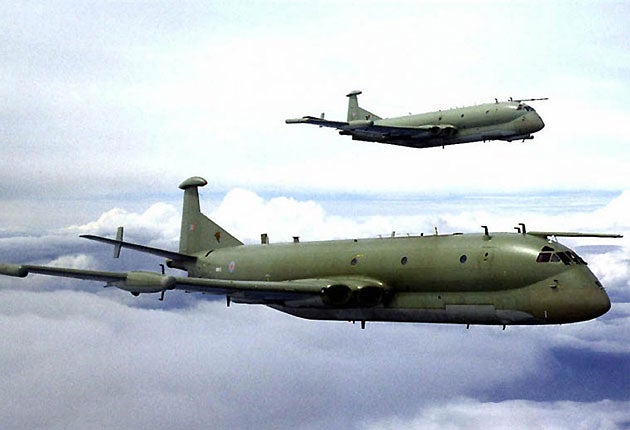MoD's Nimrod disgrace
After cost-cutting is blamed in devastating report on air crash that killed 14, ministry seeks further 'efficiency savings'

The devastating report into the Nimrod crash that killed 14 service personnel in Afghanistan in 2006 may have sent shockwaves through Whitehall, but it will not have surprised RAF personnel who believe that at least four other fatal crashes can be blamed on cost-cutting.
Charles Haddon-Cave QC used his report to accuse the Ministry of Defence of "a systematic breach of the Military Covenant" for putting its savings drive ahead of air safety. And yesterday the issue of helicopter shortages was highlighted by a leaked memo written by Lieutenant Colonel Rupert Thorneloe, who was killed in Afghanistan in July. He had cautioned that too many troops were being transported by roads, just weeks before he fell victim to a roadside bomb.
The Nimrod's safety record and issues at the centre of other fatal crashes have been highlighted by The Independent on Sunday over the past three years as part of its Military Covenant campaign.
Military pilots also highlight the collision of two Sea King helicopters in March 2003 that killed seven servicemen. A system to help pilots to spot other helicopters at night was switched off because it was fitted incorrectly and interfered with their sight.
Shortly afterwards a Tornado jet was shot down by in a "friendly fire" incident because of a known flaw in the identification system. Both crew members died. In 2005 10 people died when a Hercules transport plane was shot down. It had not been fitted with explosion-suppressant foam, which could have saved it, despite recommendations that it should be.
Two years later a Puma helicopter crashed, killing two crew. At the inquest in August the pilot said the aircraft was missing a vital piece of safety equipment and was not airworthy.
Next month safety will again come under scrutiny when a legal action brought by the relatives of the Hercules victims will be heard, while the inquest into the two men who died in the Puma crash resumes.
The Nimrod families are also pursuing a court action against the MoD, and are considering a corporate manslaughter action against BAE Systems and the defence company QinetiQ, which were also criticised by Mr Haddon-Cave.
With families of soldiers killed in Land Rovers also suing on the grounds that equipment shortages amounted to a breach of Article 2 of the Human Rights Act – the right to life – it opens up a potential Pandora's box of litigation, according to John Cooper, the barrister representing the Nimrod, Hercules and Puma families.
Air Commodore George Baber, the RAF officer in charge of the Nimrod safety check, was criticised in the report for "failing to make safety his first priority". Two months prior to the crash Air Commodore Baber had been put in charge of airworthiness for every plane and helicopter in the fleet.
Despite questions about the aircraft's safety record being raised after the explosion, Air Commodore Baber was not removed until a few months ago – after Mr Haddon-Cave informed those he intended to criticise.
Graham Knight, whose son Ben was one of those killed on the Nimrod, said the MoD was still "in denial".
"They gave the head of the Nimrod squadron an MBE for building morale after the crash," he said.
Despite the report pinning the Nimrod disaster on efficiency savings and the use of private companies, the MoD is poised to announce further cuts by outsourcing the support of front-line troops. A confidential briefing sent to MoD managers last week said: "Past efficiencies have been derived from a range of innovative arrangements with industry. The review encourages the adoption of these arrangements more broadly."
Steve Jary, the national secretary of Prospect, the union that represents MoD staff, said: "It is astonishing that the MoD is going ahead with this, just a week after the report into the Nimrod disaster. That report was a wake-up call to think again about the effect of constant change programmes, cuts and privatisation. It seems the MoD will never learn and will continue to put the lives of service personnel at unnecessary risk."
An MoD spokesman said: "Air Commodore Baber is no longer employed in a role with any connection to airworthiness or safety."
Join our commenting forum
Join thought-provoking conversations, follow other Independent readers and see their replies
Comments
Bookmark popover
Removed from bookmarks